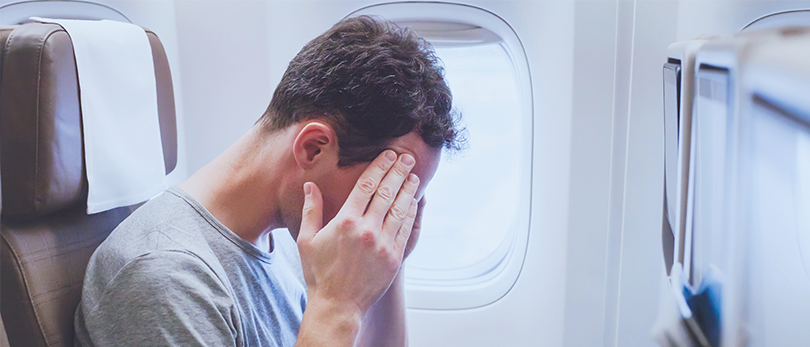What is fear of flying or aviophobia?
For many of us, flying is synonymous with travel, relaxation and fresh air. It can also be seen as a simple means of transport to get from one city to another… But if you are afraid of flying, it’s a completely different story. In this case it represents for you a real flying coffin, a machine of hell in which you have no possibility of escaping and which leads you irreparably to a certain death.

10% of the population is scared to death of flying
You may be told that “you are more likely to die in a car accident than in a plane accident”, “that the plane is the safest means of transport in the world”, but if you suffer from aviophobia you will reply that “it is also the safest way to kill yourself”. You know these adages by heart, but that doesn’t stop you from feeling very anxious every time you undertake such a trip.
Ten per cent of the population is scared to death of flying. The repercussions of this phobia can have a serious impact on private and professional life. In fact, it affects so many people that Air France has been offering courses on “managing fear of flying” for over 20 years now.
Aviophobia can be combined with other phobias
According to Rodolphe Oppenheimer (a French psychoanalyst specialising in anxiety disorders and depression), aviophobia, claustrophobia (fear of enclosed spaces) and agoraphobia (fear of public places and open spaces) are grouped together in the fear of flying. If you suffer from this, you may also be afraid of travelling on public transport, of being locked up, of not being able to escape, etc., as all these fears have space in common. In all cases, the phobia leaves no room for rational thought since it is no longer linked to real elements. It is even possible to have an aeroplane phobia without having flown at all. Studies have shown that even people who have never undertaken such a trip have a much higher level of anxiety than those who have had unpleasant experiences during a flight. This is because individuals have an anxious temperament and overestimate the level of their fear.
The origin of the fear of flying?
Disrupted landmarks
Aviophobia can also be explained by the fact that the person has little knowledge about the general functioning of an aircraft. During a flight, it is understandable that you are not reassured to hear unusual noises, to feel your body ‘fall’ when the aircraft goes through turbulence, or to find yourself sitting right next to the huge engines. Images of air crashes fuel your anxiety and bring up emotions that leave no room for rational thought. It is especially the fact that you are completely passive, unable to take any action and waiting for the plane to land safely that makes you feel very uncomfortable.
Catastrophic thoughts
The media coverage of aeroplane accidents and the traumatic images they conjure up encourage catastrophic thinking. You imagine the crash as the only outcome if you get on a plane. The fact that you only consider tragic scenarios comes from the perceptual biases at work, for example, when you focus on the severity of plane crashes rather than their rarity. So you fall victim to these automatic thoughts that install in your brain the fact that air travel is extremely dangerous.
The fear of being afraid
You can understand that your fear is not an apparent danger, that it is irrational, but you cannot control your behaviour because you have no way of controlling the situation and you have to force yourself to face it. Once you close the airlock, there is no way to turn around and escape if things go wrong. You are afraid to be afraid, always imagine the worst and fear above all that you will have a panic attack during the flight (fear of dying, going mad or suffocating…).
Aviophobia, aerophobia and aerodromophobia?
A quick internet search will show you that these three terms are used in turn to talk about air travel phobia. But are they synonymous? The answer is… yes and no! Contrary to aviophobia and aerodromophobia, which refer strictly to the fear of flying, aerophobia is in fact the fear of fresh air and wind. In common usage, however, the term aerophobia may also be used to refer to the fear of air travel. These fears are usually related to each other, so it is not uncommon for an aerophobic person to have a combination of them.


